- Home
- Gustave Flaubert
Madame Bovary (Modern Library) Page 10
Madame Bovary (Modern Library) Read online
Page 10
A man in rawhide slippers, his skin a little scarred by smallpox and sporting a velvet cap with a gold tassel, was warming his back against the fireplace. His face expressed nothing but self-satisfaction, and he appeared to be as little ruffled by life as the goldfinch suspended above his head, in a wicker cage: this was the pharmacist.
“Artémise!” cried the landlady, “break some kindling, fill the carafes, bring some brandy, look sharp! If I at least knew what dessert to offer to the company you’re expecting, Monsieur? Sweet heavens! The removal men are starting up their racket again in the billiard-room. And that cart of theirs left in front of the main door! The Hirondelle arriving’ll likely as not knock the bottom out of it! Call for Polyte, girl, tell him to put it in its proper place … to think that, since this morning, Monsieur Homais, they have played perhaps fifteen matches and drunk eight jugs of cider. But they’re going to tear that baize,” she went on, watching them at a distance, her skimmer in her hand.
“No great harm,” replied Monsieur Homais, “you’d buy another one.”
“Another billiard table!” exclaimed the widow.
“Since that one is barely holding together, Madame Lefrançois; I’ll tell you again, you’re doing yourself no favors, absolutely no favors. And besides, these days the lover of the game wants narrow pockets and heavy cues. They’re not playing marbles any longer: it’s all changed. One has to go with the times! Consider Tellier, now …”
The landlady turned red in the face with spite. The pharmacist added:
“His billiard table, whatever you say, is prettier than yours; and if it occurred to them, for example, to organize a tournament in aid of Poland or the flood victims of Lyon …”
“It isn’t rascals like him who scare us,” interrupted the landlady, shrugging her stout shoulders. “Be off with you, Monsieur Homais: as long as the Lion d’Or lives, they’ll keep on coming. We have a fair bit tucked away, we do. Instead you’ll see the Café Français closed one fine day, and with a lovely seizure bill on the shutters! What, change my billiard table,” she continued to herself, “when it’s so convenient for setting out my laundry on, and slept up to six travelers for me in the hunting season. But still no sign of that dawdler Hivert!”
“Are you waiting for him before starting your gentlemen’s dinner?” asked the pharmacist.
“Waiting for him? And what about Monsieur Binet, then! On the stroke of six you’ll see him come in: there’s none like him on earth for punctuality. He must always have his seat in the snug. He’d rather die than have to dine elsewhere. And finical eater that he is, and so particular about the cider! That’s not the case with Monsieur Léon, not him; sometimes he comes in at seven o’clock, or seven-thirty even; he doesn’t so much as glance at what he’s eating. What a nice young man! Never gives himself airs.”
“There is quite a deal of difference, do you see, between someone who has received an education and a former rifleman turned tax-gatherer.”
Six o’clock chimed. Binet entered.
He was dressed in a blue frock coat, hanging stiff and straight all about his thin body; and his leather cap, its flaps tied up with string on top of his head, revealed, under the raised visor, a bald brow in which the habitual cap had made a dent. He wore a black woolen waistcoat, a horsehair stock, gray trousers, and, all the year round, a pair of well-polished boots that had two parallel swellings, on account of his protruding toes. Not a hair was out of trim in his fair beard that, following the jaw’s contours, framed, like the edging of a flower bed, his long wan face with its tiny eyes and hooked nose. Skilled in all types of card games, a crack hunter and possessing a fine writing hand, he had a lathe at home, on which he amused himself turning napkin holders and amassing them in his house, with the jealousy of an artist and the selfishness of a bourgeois.
He proceeded to the snug; but first the three millers had to be ousted; and, during the entire time the table was being laid, Binet stayed silent in his spot, near the stove; then he closed the door and took off his cap, as was customary.
“Courtesies won’t be wearing out his tongue,” said the pharmacist, as soon as he was alone with the landlady.
“He never talks more,” she replied; “last week two cloth-salesmen were here, witty lads who told a heap of jokes that made me weep with laughter; ah well! he stayed there, mute as a herring, and not one word.”
“Yes,” the pharmacist said, “no imagination, no witticisms, nothing that constitutes the society man.”
“It’s said that he’s clever,” objected the landlady.
“Clever?” rejoined Monsieur Homais; “Him? Clever? In his own calling, perhaps,” he added, in a quieter tone. And he resumed: “Ah! That a merchant with considerable connections, that a lawyer, a doctor, an apothecary should be so engrossed, that they grow whimsical and even testy, I can understand; there’s many a citable instance in the history books. But they are at least turning something over in their minds. Take myself, as an example: how many times has it happened to me that, on searching for my pen on my desk to write out a label, I find, upon the upshot, that I have placed it above my ear!”
Meanwhile, Madame Lefrançois went to the door to see if the Hirondelle had arrived. She gave a start. A man in black entered, all of a sudden, into the kitchen. You could make out, in the last of the twilight, his rubicund face and athletic figure.
“What is your pleasure, Monsieur le Curé?” asked the inn’s landlady, at the same time reaching for one of the brass candlesticks on the chimneypiece, ranged there in a colonnade with their candles; “Can I fetch you anything? A drop of cassis? A glass of wine?”
The clergyman refused most courteously. He had come to look for his umbrella, that he had forgotten the other day at the convent of Ernemont and, having beseeched Madame Lefrançois to have it returned to him at the presbytery that evening, he left to go to the church, where the Angelus was ringing.
As soon as the pharmacist could no longer hear the tap of his shoes in the square, he found his late conduct most improper. This refusal to accept refreshment seemed to him the most obnoxious hypocrisy possible; all priests secretly tippled, and were out to restore the days of the tithe.
The landlady sprang to her priest’s defense:
“And what’s more, he could break four of you across his knee. Last year he helped our folk bring in the hay; he carried up to six bundles at once, he’s that strong!”
“Bravo!” said the pharmacist. “So send your daughters to confess to lively fellows with similar constitutions. Personally, if I was the government, I’d ordain that priests be bled once a month. Yes, Madame Lefrançois, a grand phlebotomy, every month, in the interest of public order and morality!”
“Hush now, Monsieur Homais! You’re an infidel! You’ve no faith!”
The pharmacist replied:
“I have a faith, my faith, and I’ve even more of it than all of them, with their mummery and their hocus-pocus. On the contrary, I adore God. I believe in the Supreme Being, in a Maker whatever he is, to me it’s immaterial, who has set us down here to fulfill our duties as citizen and father of a family; but I do not need to go into a church, kiss the silver plate and out of my own pocket fatten a heap of jokers who thrive better than us! You might just as effectively honor him in a wood, in a field, or even by contemplating the vault of heaven, as the ancients did. My God, as far as I’m concerned, is the God of Socrates, of Franklin, of Voltaire and of Béranger! I stand for the Profession of Faith of a Savoyard Vicar and the immortal principles of ’89! Nor do I acknowledge an old codger of a God who takes a turn in his garden plot with his walking stick, entertains his friends in the bellies of whales, expires with a cry and comes back to life three days later: matters preposterous in themselves and completely opposed, moreover, to all the laws of natural philosophy; which proves, by the by, that priests have always wallowed in a vile ignorance, in which they strive to engulf the populace along with themselves.”
He held his tongue, gaze searching aro
und for an audience, because, in his exuberance, the pharmacist had momentarily believed himself to be in the middle of a town council meeting. But the landlady was no longer listening. She was straining to hear a distant rumble. The rattle of a carriage could be discerned, mixed up with a clattering of slack horseshoes hammering the ground, and at last the Hirondelle came to a halt in front of the door.
It was a yellow crate carried on two big wheels which, reaching the height of the canopy, prevented the passengers seeing the road and dirtied their shoulders. The little panes of its narrow quarterlight windows trembled in their frames when the carriage was closed, and preserved spots of mud, here and there, amidst their ancient coating of dust that even rainstorms did not entirely wash away. It was drawn by three horses, the first in a leader’s traces, and, when alighted from at either side, touched bottom with a bump.
A few worthy citizens of Yonville arrived in the square; they were all talking at the same time, asking for news, explanations and baskets; Hivert was at a loss to know whom to satisfy. He was the one who carried out the local commissions in town. He would go into the shops, bringing back rolls of leather for the cobbler, scrap iron for the farrier, a barrel of herring for the inn, bonnets from the milliner’s, toupees from the hairdresser’s; and, the whole way back, he would distribute these parcels, throwing them over fences, standing upright on his seat and calling out at the top of his voice, while his horses trotted on by themselves.
An accident had held him up: Madame Bovary’s greyhound bitch had run away over the fields. They had whistled after her for a good quarter of an hour. Hivert had even gone back a mile or so, thinking he might spot her at any minute; but they had had to carry on. Emma had wept, flown into a passion; she had blamed Charles for this misfortune. Monsieur Lheureux, cloth merchant, who was with her in the vehicle, had tried to console her with numerous examples of lost dogs recognizing their master after long years. There was one case, he said, of a dog that had returned from Constantinople to Paris. Another had gone a hundred and fifty miles in a straight line and swum four rivers; and his own father had owned a poodle which, after twelve years’ absence, had suddenly leapt up at him one evening, in the street, when he was off to dine in town.
II
Emma alighted first, then Félicité, Monsieur Lheureux, a wet nurse, and they had to wake Charles up in his corner, where he had fallen fast asleep the moment night fell.
Homais introduced himself; he presented his compliments to Madame, his respects to Monsieur, said how delighted he was to be able to render them whatever service, and added with a cordial air that he had dared to invite himself along, his wife happening to be away.
Madame Bovary, once in the kitchen, went up to the fireplace. With the tips of her two fingers, she caught her gown at knee height, and, having thus raised it to her ankles, she held out to the flame, above the revolving leg of mutton, one foot enclosed in a small black boot. The fire lit her up in her entirety, its raw light penetrating the weave of her dress, the smooth pores of her white skin and even her eyelids that she half-closed from time to time. An intense crimson hue swept over her, whenever a puff of wind came in through the half-open door.
From the other side of the fireplace, a young man with fair hair watched her in silence.
As he was heartily bored at Yonville, where he was clerk to the lawyer Guillaumin, Monsieur Léon Dupuis (he it was, the other regular at the Lion d’Or) would often defer the moment of his meal, hoping that some traveler would come to the inn with whom he might chat in the course of the evening. Indeed, on days when his work was done, he was more or less obliged, for want of any other occupation, to arrive punctually, and suffer Binet’s conversation from the soup to the cheese. So he accepted with delight the landlady’s proposal that he dine in the company of the new arrivals, and they passed into the big parlor, where Madame Lefrançois, out of ostentation, had had the four covers laid.
Homais asked permission to keep on his bonnet-grec, for fear of a head cold.
Then, turning to his neighbor:
“Madame, no doubt, is a little weary? One is so terribly tossed about in that Hirondelle of ours!”
“That’s true,” said Emma; “but disturbance always diverts me; I like changing places.”
“It’s such a dull affair,” sighed the clerk, “just to spend one’s life confined to the same spot!”
“If you were like me,” said Charles, “endlessly obliged to be on horseback …”
“But,” Léon went on, addressing himself to Madame Bovary, “there’s nothing more agreeable, to my mind; when you’re able to,” he added.
“Yet,” said the apothecary, “the practice of medicine is not overly taxing in our region; for the state of our roads permits the use of the gig, and, generally speaking, one is paid reasonably, the farmers being well-off. We have, medically, aside from the normal cases of enteritis, bronchitis, bilious ailments, etc., some sporadic fevers now and again at harvest time, but, overall, few serious cases, nothing special to note, except for a decent amount of scrofula, no doubt due to the appalling conditions of hygiene in our peasant dwellings. Ah! you will come across much prejudice to battle against, Monsieur Bovary; much routine stubbornness, with which your every scientific effort will clash daily; for they still have recourse to novenas, to relics, to the priest, rather than going as a matter of course to the doctor or to the pharmacist. The climate, however, is not, to tell the truth, bad, and we even count several ninety-year-olds in the commune. The thermometer (I have taken the readings myself) goes down to four degrees in winter, and, in high summer, touches twenty-five, thirty degrees Centigrade at the very most, which gives us a maximum of twenty-four Réaumur, or else fifty-four Fahrenheit (English scale), no higher!—and, indeed, we are sheltered from the northerly winds by the Forest of Argueil on the one side, and by Saint-Jean’s hill from the westerly winds on the other; and this heat, meanwhile, on account of the water vapor given off by the river and the considerable presence of cattle in the fields—which emit, as you know, much ammonia, that’s to say, azotic gas, hydrogen and oxygen (no, just azotic gas and hydrogen)—and which, sucking up the humus from the earth, blending all these different emanations, reuniting them in a bundle, so to speak, and itself combining with the electricity diffused in the atmosphere, when there is any, can in the long term, as in the tropics, spawn unhealthy miasmas;—this heat, I say, is precisely tempered on the side where it comes from, or rather from where it would be coming, that’s to say the south side, by the southeasterly winds, which, themselves being cooled as they cross the Seine, sometimes reach us all of a sudden, like the winds from Russia!”
“Have you at least some walks in the vicinity?” continued Madame Bovary, speaking to the young man.
“Oh, very few,” he replied. “There’s a spot known as the Pasture, at the top of the hill, on the edge of the forest. Sometimes, of a Sunday, I go up there with a book, and stay to watch the sunset.”
“There’s nothing I admire more than a sunset,” she resumed, “but by the seaside, especially.”
“Oh! I adore the sea,” said Monsieur Léon.
“And then, does it not seem to you,” replied Madame Bovary, “that the mind sails more freely on that limitless expanse, whose contemplation lifts the soul and imparts ideas of the infinite, of the ideal?”
“It’s the same with mountain landscapes,” Léon went on. “I’ve a cousin who traveled through Switzerland last year, and who told me that you cannot imagine the poetry of the lakes, the charm of the waterfalls, the gigantic effect of the glaciers. You see pines of an incredible size, lying across torrents, cottages hanging above precipices, and, a thousand feet below, entire valleys, when there’s a break in the clouds. Such sights must enrapture, be an inducement to prayer, to ecstasy! And I no longer feel astonished by this celebrated musician who, to better stimulate his imagination, was wont to go off and play the piano before some imposing site or other.”
“You play music?” she asked.
>
“No, but I like it very much,” he replied.
“Ah! don’t listen to him, Madame Bovary,” Homais interrupted, leaning over his plate, “that’s pure modesty.—What, my dear boy? Well! The other day, in your room, you were singing The Guardian Angel quite delightfully. I heard you from the laboratory; you articulated the words like an actor.”
Léon did, indeed, lodge at the pharmacist’s, where he had a little room on the second floor, overlooking the square. He blushed at this compliment from his landlord, who had already turned to the doctor and was enumerating the principal inhabitants of Yonville one after the other. He recounted anecdotes, proffered information; the notary’s wealth was not known precisely, and there was the Tuvache household which caused great to-do.
Emma took up again:
“And which music do you prefer?”
“Oh! German music, the sort that induces dreams.”
“Do you know the Italians?”
“Not yet; but I shall see them next year, when I go to live in Paris, to finish my law studies.”
“As I had the honor,” said the apothecary, “to convey to your husband with reference to this wretched Yanoda fellow who took off, you will, thanks to his imprudent actions, find yourself enjoying one of the most comfortable houses in Yonville. Its chief convenience for a doctor, is that it has a door onto the Alley Walk, which lets you go in and out without being seen. Moreover, it is furnished with all that’s pleasing in a household: washhouse, kitchen with pantry, family parlor, fruit loft and so forth. He was a jolly fellow who never thought twice about spending! He had built for himself, at the bottom of the garden, beside the water, an arbor expressly for summertime beer drinking, and if Madame likes to garden, she can …”

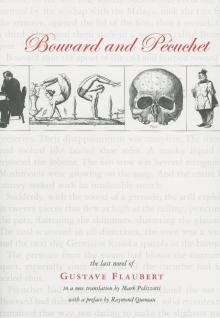 Bouvard and Pecuchet
Bouvard and Pecuchet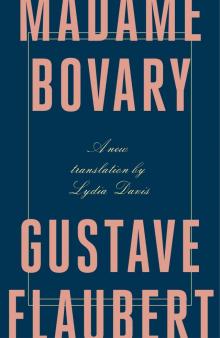 Madame Bovary
Madame Bovary The Temptation of St. Antony
The Temptation of St. Antony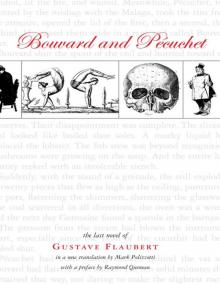 Bouvard and Pécuchet: A Tragi-comic Novel of Bourgeois Life, part 1
Bouvard and Pécuchet: A Tragi-comic Novel of Bourgeois Life, part 1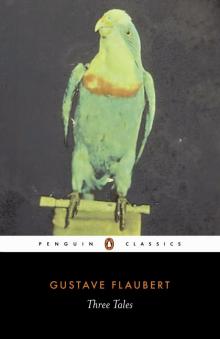 Three Tales
Three Tales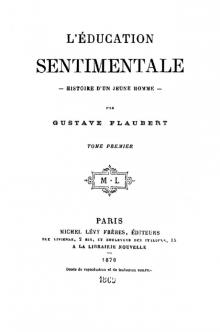 Education sentimentale. English
Education sentimentale. English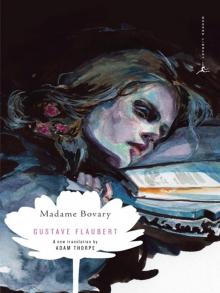 Madame Bovary (Modern Library)
Madame Bovary (Modern Library)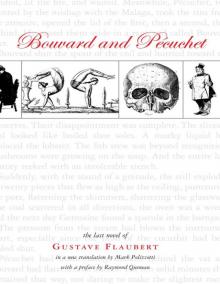 Bouvard and Pécuchet: A Tragi-comic Novel of Bourgeois Life, part 2
Bouvard and Pécuchet: A Tragi-comic Novel of Bourgeois Life, part 2 Sentimental Education; Or, The History of a Young Man. Volume 1
Sentimental Education; Or, The History of a Young Man. Volume 1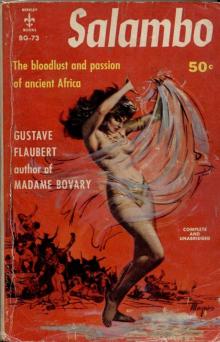 Salammbo
Salammbo Memoirs of a Madman and November
Memoirs of a Madman and November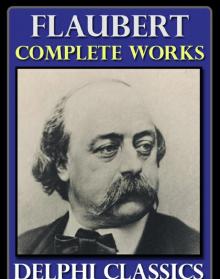 Complete Works of Gustave Flaubert
Complete Works of Gustave Flaubert